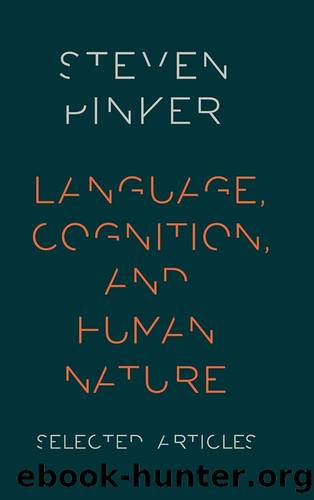Language, Cognition, and Human Nature by Steven Pinker by Pinker Steven

Author:Pinker, Steven [Pinker, Steven]
Language: eng
Format: epub
Tags: Psychology, Science, Philosophy, Writing
Amazon: B01K0UVTRW
Goodreads: 132886442
Publisher: OUP USA
Published: 2013-01-01T08:00:00+00:00
Unlike irregular past tense forms, regular past tense forms do not suff er in well-formedness on account of frequency, familiarity, idiomaticity, frozenness, or restricted syntactic contexts. Pinker and Prince (1988) noted that though the verb perambulate may be of low frequency, it is no worse-sounding in its past tense form than it is in its stem form; there is no feeling that perambulated is a worse past tense form of perambulate than walked is of walk. In fact, a verb can be of essentially zero frequency and still have a regular past tense form that is judged as no worse than the verb itself. Th
ough
fl eech, fl eer, and anastomose are unknown to most speakers, speakers judge fl eeched, fl eered, and anastomosed to be perfectly good as the past tense forms of those verbs. Th
ese observations have been confi rmed experimentally by Ullman
(1993) , in a study in which people judged the naturalness of hundreds of verbs and their past tense forms. Subjectsâ ratings of regular pasts correlate highly with their ratings of the corresponding stems, but not with the frequency of the past form (partialing out stem rating). In contrast, ratings of irregular pasts correlate less strongly with their stem ratings but signifi cantly with past frequency, partialing out stem rating.
Unlike irregular verbs, when a regular verb gets trapped in a frozen or restricted expression, putt ing it into the past tense makes it no worse. For example, the verb eke is seldom used outside contexts such as She ekes out a living, but She eked out a living, unlike forwent the pleasure of, does not suff er because of it. Similarly: He crooked his fi nger; She stinted no eff ort; I broached the subject with him; Th e news augured well
1 9 2
L A N G UAG E , C O G N I T IO N , A N D H U M A N N AT U R E
for his chances. Th
e regular verb to aff ord, like the irregular verb to stand, usually occurs as a complement to canât, but when liberated from this context its past tense form is perfectly natural: I donât know how she aff orded it. Similarly, both She doesnât suff er fools gladly and She never suff ered fools gladly are acceptable.
Th
e phenomena discussed in this section and the preceding one show why the apparent gradedness of acceptability of regular forms like pleaded or weeped can be localized to the gradedness of the corresponding irregulars, thanks to the eff ects of the Blocking principle, and are not inherent to the regular verbs per se. Th e gradedness of certain irregulars generally comes from low frequency combined with similarity to the prototypes of their subclasses ( Ullman, 1993 ). But for regular verbs that do not compete with specifi c irregular roots, there is no complementary landscape of acceptability defi ned by phonology and frequency; all are equally good.
3 . D E F A U LT S T R
Download
This site does not store any files on its server. We only index and link to content provided by other sites. Please contact the content providers to delete copyright contents if any and email us, we'll remove relevant links or contents immediately.
Cecilia; Or, Memoirs of an Heiress — Volume 1 by Fanny Burney(32558)
Cecilia; Or, Memoirs of an Heiress — Volume 2 by Fanny Burney(31956)
Cecilia; Or, Memoirs of an Heiress — Volume 3 by Fanny Burney(31942)
The Lost Art of Listening by Michael P. Nichols(7506)
Asking the Right Questions: A Guide to Critical Thinking by M. Neil Browne & Stuart M. Keeley(5775)
We Need to Talk by Celeste Headlee(5615)
On Writing A Memoir of the Craft by Stephen King(4944)
Dialogue by Robert McKee(4405)
Pre-Suasion: A Revolutionary Way to Influence and Persuade by Robert Cialdini(4232)
I Have Something to Say: Mastering the Art of Public Speaking in an Age of Disconnection by John Bowe(3887)
Elements of Style 2017 by Richard De A'Morelli(3350)
The Book of Human Emotions by Tiffany Watt Smith(3309)
Fluent Forever: How to Learn Any Language Fast and Never Forget It by Gabriel Wyner(3085)
Name Book, The: Over 10,000 Names--Their Meanings, Origins, and Spiritual Significance by Astoria Dorothy(2987)
Why I Write by George Orwell(2955)
Good Humor, Bad Taste: A Sociology of the Joke by Kuipers Giselinde(2950)
The Art Of Deception by Kevin Mitnick(2804)
The Grammaring Guide to English Grammar with Exercises by Péter Simon(2744)
Ancient Worlds by Michael Scott(2688)
